Deadpool & Wolverine VFX Supervisor Reflects On Fight Scenes & Logan"s Mask


Summary
- Deadpool & Wolverine is a huge success in 2024, opening up opportunities for Marvel characters to cross paths.
- Wētā FX worked on the iconic mask adaptation for Wolverine in the film, focusing on maintaining believability.
- The VFX team behind the film faced challenges with practical effects and balancing Easter eggs in the Void scenes.
Wētā FX Supervisor Dan Macarin details working on Logan's iconic Marvel superhero mask and reuniting with Ryan Reynolds for Deadpool & Wolverine. Despite having their lightest release schedule in a very long time on the theatrical side, Deadpool & Wolverine has already become one of the biggest hits of 2024. With the ending of Deadpool & Wolverine, the Marvel Cinematic Universe has finally set up the bridge for the characters to cross paths with the Avengers-based franchise in upcoming Phase 6 films.
From all the major Marvel Easter eggs and references in Deadpool & Wolverine to the many cameos they had in store for the audience, the Phase 5 film served as a major celebration of the Fox-Marvel era. As Wade Wilson and Logan joined forces to save their universe, Deadpool & Wolverine have left the world wanting to see more of them in the MCU's future. Following its critical and box office success, time will tell where Reynolds and Hugh Jackman will show up next in The Multiverse Saga.
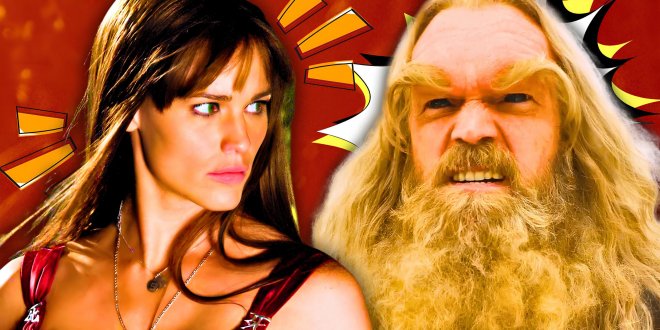 Related Every Cameo in Deadpool & Wolverine Explained Deadpool & Wolverine is packed to the brim with cameos from across the entire run of Marvel films, combining the numerous timelines together.
Related Every Cameo in Deadpool & Wolverine Explained Deadpool & Wolverine is packed to the brim with cameos from across the entire run of Marvel films, combining the numerous timelines together.
6 One of the VFX companies that worked on Deadpool & Wolverine was Wētā FX, after working on Deadpool and Deadpool 2, making this the perfect reunion for the third installment in the trilogy. Screen Rant recently had the chance to chat with Wētā FX Supervisor Dan Macarin on taking on some of the biggest VFX work in Deadpool & Wolverine. Throughout the interview, Macarin spoke about the many elements Wētā FX were in charge of, from the iconic "Bye, Bye, Bye" opening fight sequence, adapting Wolverine's mask, and honoring the Marvel lore in Deadpool & Wolverine.
Dan Macarin Breaks Down Wētā FX's Work On Deadpool & Wolverine Close Screen Rant: First of all, I want to just say a massive congratulations on the masterpiece that this film has become. I don't know how much you're following that conversation online, but it's breaking records; everyone is loving it. Are you following the big hype around the film, or are you just focusing on work right now?
Dan Macarin: First, thank you very much and the whole team is following it. It's a huge amount of excitement for us. We watch it with utter pleasure as we see this making records and even beating the work that we did on Deadpool 2. Everyone's watching it and posting and chatting and bringing up everything that they see online because it is as huge for us as it is for the studio and everyone else. We're incredibly happy.
I know this film has been in the works for almost two years now until we finally got it. Can you talk about getting involved, being asked to come back for the end of this trilogy, but also now really starting a new chapter for Deadpool? What were things that you and your team were excited to really up the ante on from your previous experience?
Dan Macarin: Because we had previously worked with Ryan [Reynolds] for so long, even though there was a new team on this film with Shawn [Levy,] the director and the new Marvel team, Ryan really fought to bring us back for this. We have such a good relationship back and forth. He knew that this would just be the most fluid way to continue this character. We are really happy that we have that relationship and we're able to continue work like that. He has such trust in what we do that it made that really, really easy and being asked to go back on Deadpool, we love working on the Deadpool series, so obviously there's a huge amount of excitement of like, 'Of course, yes!' They're like, 'How many shots do you want to do?' and we're like, 'As many as you want to give us, just keep 'em coming.'
Those conversations are really easy because you have the team, you know what you're going to do, and the work is fantastic to be able to be a part of everything that the excitement of this show and what we really wanted to do. The first thing when we looked at it, when we saw behind the scenes [of] the Wolverine mask, it was like, 'Oh, we have to do that! and they're like, 'No, no, no, no, we're going to leave that one alone. Just leave the mask as is, just [focus on] Deadpool.' It was like, 'No, no, we have to do Wolverine. That is something that we want to be a part of, and we want to bring to life.' Over time, we did get to do that and that became a really big thing for us. So it was a new challenge and something that we were really glad to be able to bring to the film.
Dan Macarin Explains How Wolverine's Iconic Mask Was Adapted For Deadpool & Wolverine "I don't want people talking about how it was all digital and how he didn't really wear the mask or something else." 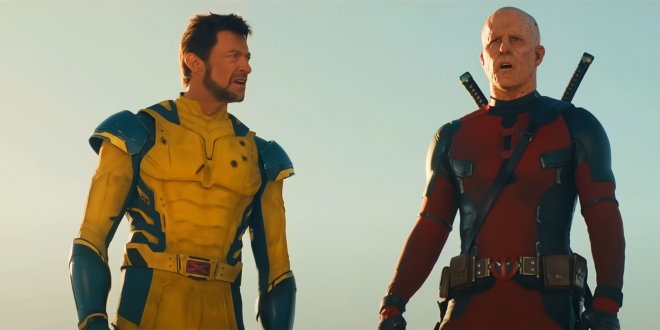 Because you guys have already been part of working with Ryan and working with the way that the Deadpool mask comes off visually and practically, how much of that were you able to apply for Hugh's Wolverine mask? Or did that style kind of have to be modified just because even though you can kind of say there are similar masks, it is also so vastly different. So, what were some challenges that came with that?
Because you guys have already been part of working with Ryan and working with the way that the Deadpool mask comes off visually and practically, how much of that were you able to apply for Hugh's Wolverine mask? Or did that style kind of have to be modified just because even though you can kind of say there are similar masks, it is also so vastly different. So, what were some challenges that came with that?
Dan Macarin: We had a couple of new challenges with the Deadpool mask because even though it seems similar, it was an update from Deadpool 2. So there were new things that we had to figure out – new seam lines, new adjustments, adjustments to the leather and the mesh on the eye. Once we had adjusted those kinds of things, and we started looking at Wolverine and the discussion started coming in, it's not actually the same. What do we have to look at with this mask and make adjustments for Deadpool? We have certain movements for the leather versus the fabric. They change in speed, they change in pressure, they change in how much they're able to stretch or move for the believability of the material that it is. When you look at Wolverine, he has metal wings that come off the eye, and if we were to move those as much as we move, say, the black leather on Deadpool, it very quickly becomes cartoony.
The filmmakers were really, really worried [because] this is what the most discussion came around of. I don't want it to look animated. I don't want to take away from Hugh's performance. I don't want people talking about how it was all digital and how he didn't really wear the mask or something else. It was like, 'Okay, anything that we do to this mask has to be kept in the realm of believability. It has to still feel real.' So we kept that metal almost entirely locked. It had a very small amount of movement, but the more movement came a little bit more [of] like a traditional superhero mask where it's within the metal and the yellow fabric that is on top of the metal. As we focused on that, we found the best way to connect it to Hugh's performance and give you the emotion in the eyes as far as we felt we could take it without turning it into a kind of animated character that would distract people.
Based on when I saw the film, and again, because as someone who's been waiting to see this mask for I don't know how many years: I refused to blink, so I just kept looking. It doesn't feel like it's digital, it feels as real as it possibly could be. And that's just a testament to the work you guys have done. If you had to say maybe percentage-wise because it doesn't sound like there was as much digital work required to do on the Wolverine mask from what you were saying compared to Deadpool, because he's Wade Wilson, he's so animated when he talks.
Dan Macarin: We went in a lot of different ranges – Wolverine in the comics, he is still quite animated. He has a very particular set of eye movements and eye shapes. It can come down and have a really, really sharp angle when he's angry. At first, we looked at going full comic book with a lot of references and saying, 'We can bring this character right out of the comic, and comic book fans will love it.' But there were people who aren't necessarily maybe as nerdy as we are and as much comic book fans, that they may not recognize those eye shapes, and it may distract them. So we had a range of full comic book and then we started going, 'Okay, 50% back down to 30%, to 20%' and then finding that range of what made it look like Wolverine, but also you still recognize ,it's Hugh and it's a person and it's not something doing these kind of shapes that a 2D image needs to express, but a 3D image doesn't necessarily need to portray for you to get the emotion out.
Could you speak to how involved Hugh was in this part of the process? Because this is a character he's played for over 20 years now, and again, finally, he gets to have this moment. Did he get any input, or did you guys have any conversation of how to find that perfect balance?
Dan Macarin: No, – outside, normally with Ryan, if he's worried about a particular shot or he has a specific idea in mind, he'll take a video of himself, and he'll send it through to us just with his phone, and he'll say like, 'Hey, try it this way, or make him do up like this and then down and really go angry. 'You're like, 'Okay, I see what you're after' and sometimes he'll try a few different ways and ask us to give him a couple of options, but we can't really see his face under the mask because it is him playing. [With] Hugh, we do have more room, we can see his cheeks moving, we can see his nose moving, we can see his jaw moving. So this gave us a lot of insight of like, 'Alright, I have enough reference of Hugh Jackman that when his cheeks go up like this, I know the facial expression that he's making and I can match to that.'
I don't need as much hands-on from Hugh. I don't need him to be as much of a part of it because I understand what he's after and what look I need to give him. Things like when we played a few jokes at the start of the film where we had a zombie Logan head on the skeleton. Those were things that Ryan really wanted to surprise Hugh with and really wanted to have a lot of fun with it. So that was kind of a planned idea of making him laugh and making him a part of the experience end.
FX Supervisor Explains The Gruesome Ending To Logan's Corpse 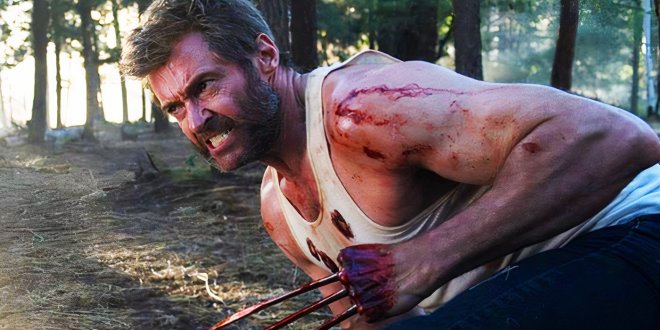 Let's talk about the zombie Logan corpse – I was like, 'There's no way they're going to get the corpse up. There's no way we're going to see that.' before I went, 'Okay, yeah, here we go!' What was the decision-making process behind of how much of Wolverine would be shown with his corpse at the beginning Do we go fall out, do we just play with the skull, what were those conversations like?
Let's talk about the zombie Logan corpse – I was like, 'There's no way they're going to get the corpse up. There's no way we're going to see that.' before I went, 'Okay, yeah, here we go!' What was the decision-making process behind of how much of Wolverine would be shown with his corpse at the beginning Do we go fall out, do we just play with the skull, what were those conversations like?
Dan Macarin: It sounded a lot like that. The conversations we had with the skeleton were like, 'Well, if we show too much skin, people might think, why doesn't he just come back to life? If his skin is there, then he should be able to heal. He should start coming back and is that what's going to happen in the movie? Are you going to see his eye turn to life or something else?' So originally, after the initial discussions, which started having a really gross zombie prosthetic be pulled out of the grave, they quickly said, 'You know what? Let's just do a silver skeleton and make it all metal adamantium. People will recognize it, they'll get it, it'll be really deteriorated and just raggedy, that'll work.' But as the sequence played on, people were watching it, and Ryan was like, 'You know what? I really want to desecrate Jackman's corpse.
We need to make this the next level. I want to make it funnier and the skin is funny.' We’ve worked with Hugh Jackman before before as we've worked on films like The Wolverine, and we brought some of those back. We got the art team in, we started putting our scans onto the head and different levels of zombie-fying it. What does an eye look on a mummy and how much do you have to deteriorate it? After a large number of concepts from our art team, we found the level of desecration that they wanted with a few particular caveats. They had a whole plan and all of this in the conversation rotated around the idea of, the reason we want to do this is when we show Hugh's credit, we want the skin to rip off and reveal it. It was like, 'Okay, we need to make sure that the skin covered enough of the forehead that it didn't look like part of the credit was hanging out or that you could see it in earlier shots.' This was a kind of big reveal for everyone that this was stamped in there.
We had a couple of things that we had to make sure worked for the sequence, but the rest of it, they were mostly conversations around what's funny about a skeleton and what's not. Do you have pieces of his ear falling off? Should his jaw be dangling? Should the lip pop out? Does the eye pop out when he gets punched? How far can you go without it seeming ridiculous? But we do want some level of ridiculous because it's supposed to be a funny moment and you want to feel like, 'Oh God, he is going to town on this skeleton with no regard to Logan's legacy or his memory.' That's part of the humor that we tried to find thus the best balance for
Bringing Loki's Void Into Deadpool & Wolverine "The most important thing is the story and where the audiences go and what we're trying to direct them to." 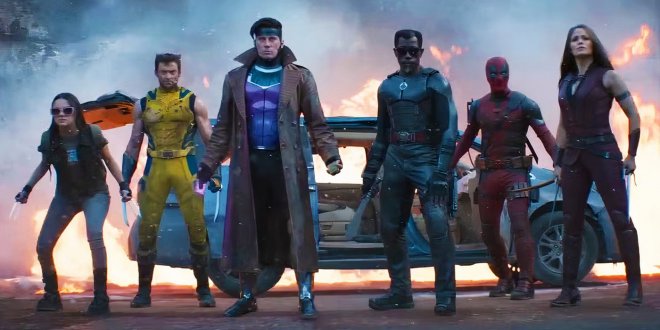 I know there was a lot of work on the Void and the sand wasteland aspect. How much from the Loki TV show scenes in the Void, did that you all pull from as inspiration for all the wasteland action? One of the things I love about this film is how practical it is; there are a lot of real sets, from what I understood, that Shawn wanted to do. So what can you talk about that?
I know there was a lot of work on the Void and the sand wasteland aspect. How much from the Loki TV show scenes in the Void, did that you all pull from as inspiration for all the wasteland action? One of the things I love about this film is how practical it is; there are a lot of real sets, from what I understood, that Shawn wanted to do. So what can you talk about that?
Dan Macarin: You'll look at some shots and you're like, 'Oh man, that's an incredible environment.' But if you look at the raw plate, they went down to South America, and they shot some absolutely stunning environments and we got to the place and we're like, 'Wow, what do you want to do with this?' At that point it became a very creative conversation of what do you want to fill the Void with? We went back and forth. So with the Loki TV show, and they have certain effects where you'll see a kind of glow in the sky, and things kind of drop into the Void, like a trash can of dumping ground of areas, getting purged from different timelines. We took that reference, we started adding those kinds of things in.
And very quickly, I'll say, we went through a lot of options because at the end of the day, the most important thing is the story and where the audiences go and what we're trying to direct them to. The more we added these things, like the effect in the sky of things dumping in, we noticed like, 'Oh man, that's really cool, but that's where my eye went, and my eye is supposed to be on the car driving through the desert, so the more I add to this that is moving, I lose the very small thing that is moving in screen that you're supposed to be watching.' That was kind of the back and forth that made the Void difficult of 'I want to add in as many Easter eggs as I can, as many fun things as I can that the audience will see on probably second or third watch and be like, 'Wow, I never saw that before! There's a ship in the water. Oh, I know what ship that is and what movie it's from.'
Those are really, really fun moments for us, but we had to do them in a way that wasn't distracting. A lot of the options in the Void circled around what can we do that still keeps the audience's focus? The selection of vehicles, ships in the background or the amount of trash, the color tones, what was going on in the sky were all specific to being there, but not being overwhelming within the visual frame.
Seeing Channing Tatum Finally As Gambit In Deadpool & Wolverine 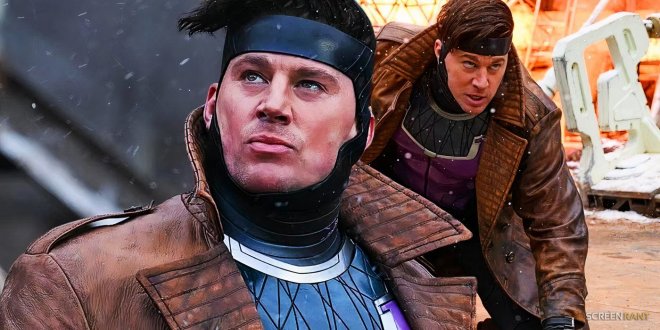 Custom image by Felipe Rangel One of my favorite aspects of the film, which was, of course, a huge surprise, seeing Gambit finally getting to take part. Did you guys have any involvement with bringing Gambit's action beats to life?
Custom image by Felipe Rangel One of my favorite aspects of the film, which was, of course, a huge surprise, seeing Gambit finally getting to take part. Did you guys have any involvement with bringing Gambit's action beats to life?
Dan Macarin: No. We had a few set extensions with Gambit in it. We had a lot of sequences where there's dialogue back and forth between Gambit and Deadpool and Wolverine, but nothing on his specific character. So it was really just making sure that as Gambit is speaking and his performance, I think, shocked everyone in how fantastic it is for that character, making sure that Deadpool plays off him very well, and that his expression matches the crazy dialogue that Channing Tatum came up with a lot of times on the spot.
The reactions from Deadpool had to feel natural and kind of a little out there. 'What did he just say? Oh my God! and the way they played back and forth was incredibly important to us for that moment because this is what will sell Gambit to the audience is if they play well together and people love seeing them on screen, this is what's going to get them to ask for more, and they're going to want to see these two together again. They're going to want to see Gambit with other characters. That aspect of it was really important to us, but Gambit himself was part of other vendors' work and a different series of sequences.
Basically, you're confirming that we're going to see Gambit again? [Laughs] I'm kidding. I'm kidding!
Dan Macarin: I have no idea about any of those things. I think that's entirely up to fans and the Marvel team. I say that as a fan, we watch the performance and you're like, 'Oh my God, they didn't!' and you finish the sequence, you're like, 'Oh my God, this works. Oh, I want to see more of this. Oh, I hope they bring him back!' They never tell us anything with that, but I would love to hope that he does make a return.
Dan Macarin On The State Of VFX For Marvel Studios "We wanted to get our hands on as much work as we possibly could with this film." 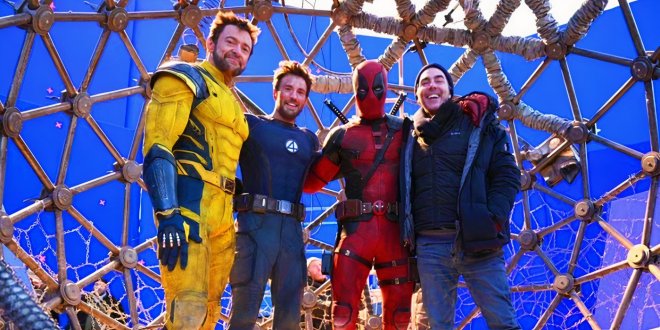 As someone who loves this film, you can tell that this film is made by people who love these characters and love this universe. I know VFX has been going through a lot over the last few years in light of the pandemic, and then, of course, the work demands from various students, especially with Marvel films. I just wanted to get your take on the conversation that people are having about VFX in terms of VFX teams getting enough time to work on everything or how many changes are being made if that's something you can speak on.
As someone who loves this film, you can tell that this film is made by people who love these characters and love this universe. I know VFX has been going through a lot over the last few years in light of the pandemic, and then, of course, the work demands from various students, especially with Marvel films. I just wanted to get your take on the conversation that people are having about VFX in terms of VFX teams getting enough time to work on everything or how many changes are being made if that's something you can speak on.
Dan Macarin: Sure – Wētā has a really great work-life balance, and we didn't have to actually work any crazy hours because [of] the relationship that we have with Marvel and Ryan and the team of Maximum Effort. They're very open conversations and the creative is actually quite easy on this show to have. The only, I think, real difficult thing that we have to work with is that we have so many fans on the show that want to put everything they possibly can into every shot. [that] we're like, 'We got to move on guys, come on. I know you've shot your face in the mirror 27 times trying to act like Ryan Reynolds, but we do have more shots to do.' It was always new marketing material coming in, so we wanted to get our hands on as much work as we possibly could with this film. I think pulling the artists away from it was probably the most difficult.
As I get ready to wrap up, I don't know if you can't tease what's next, but I know you've worked on so many Marvel properties now. Do you have your next gig lined up with Marvel Studios, by any chance?
Dan Macarin: No, we don't usually find out about anything Marvel-wise until it's almost ready to go. They keep a lot of that heavily under wraps, so it's usually a surprise to us of we get a call in like, 'Hey, they want to talk about Deadpool & Wolverine.' You're like, 'Really? Oh my God, yes. Okay, hold on, I'm closing out my meetings right now. I'm going!' So we always joke, we'll be on a client call with them. We're like, 'Hey, so what do we doing next? We doing something else?'
Yeah, maybe Avengers: Secret Wars, Avengers: Doomsday…
Dan Macarin: 'Are we doing Avengers?' and then someone will pop in, 'We're not talking about this. No spoilers!' and we're like, 'Ah, come on!' You try to get it out of them. But they're really good, they keep it tightlipped.
More About Deadpool & Wolverine Your browser does not support the video tag. Marvel Studios presents their most significant mistake to date—"Deadpool & Wolverine." A listless Wade Wilson toils away in civilian life. His days as the morally flexible mercenary, Deadpool, behind him. When his homeworld faces an existential threat, Wade must reluctantly suit-up again with an even more reluctantlier… reluctanter? Reluctantest? He must convince a reluctant Wolverine to—F–k. Synopses are so f—–g stupid.
Check out our other Deadpool & Wolverine interviews:
- Ryan Reynolds (Wade Wilson/Deadpool), Hugh Jackman (Logan/Wolverine) & Shawn Levy (Director)
- Emma Corrin (Cassandra Nova) & Matthew Macfadyen (Paradox)
- Aaron Stanford (Pyro)
- Kevin Feige (Marvel Studios President)
- Wendy Jacobson (Producer)
Deadpool & Wolverine is now playing in theaters.
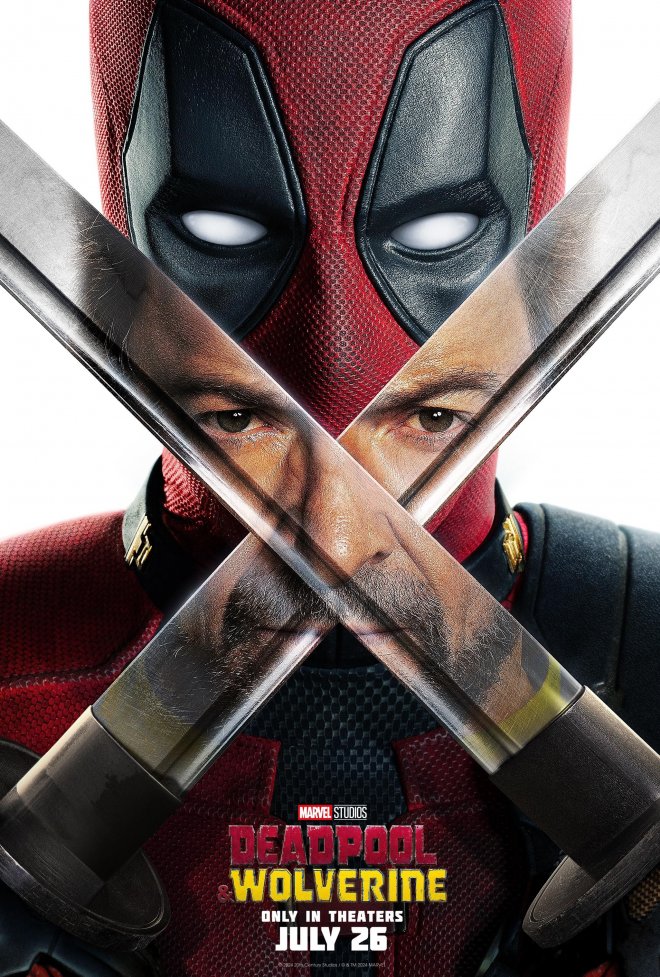 Deadpool & Wolverine R A follow-up to the highly successful Deadpool and Deadpool 2 films starring Ryan Reynolds as the Merc with a Mouth. The third film will be the first in the franchise to be developed under the Marvel Studios banner following Disney's acquisition of 20th Century Fox.
Deadpool & Wolverine R A follow-up to the highly successful Deadpool and Deadpool 2 films starring Ryan Reynolds as the Merc with a Mouth. The third film will be the first in the franchise to be developed under the Marvel Studios banner following Disney's acquisition of 20th Century Fox.
Director Shawn Levy Release Date July 26, 2024 Studio(s) Marvel , Maximum Effort Distributor(s) Disney Writers Rhett Reese , Paul Wernick , Shawn Levy , Ryan Reynolds , Zeb Wells , Rob Liefeld , Fabian Nicieza Cast Ryan Reynolds , Hugh Jackman , Emma Corrin , Morena Baccarin , Rob Delaney , Leslie Uggams , Karan Soni , Matthew Macfadyen , Brianna Hildebrand , Shioli Kutsuna , Stefan Kapicic , Lewis Tan , Randal Reeder , Jennifer Garner , Aaron Stanford , Billy Clements , Ollie Palmer , Chris Hemsworth , Rob McElhenney Runtime 127 Minutes Franchise(s) Deadpool , Marvel Cinematic Universe prequel(s) Deadpool , Deadpool 2 Main Genre Action Expand Upcoming MCU Movies Captain America: Brave New World
Release Date February 14, 2025 Thunderbolts*
Release Date May 2, 2025 The Fantastic Four (2025)
Release Date July 25, 2025 Blade (2025)
Release Date November 7, 2025 Avengers: Doomsday
Release Date May 1, 2026 Avengers: Secret Wars
Release Date May 7, 2027